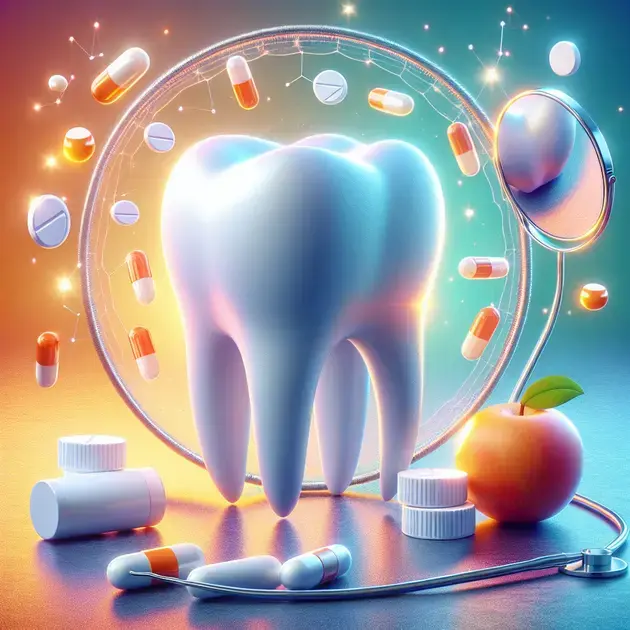Periodontitis is a common but serious gum infection that can damage the soft tissue and destroy the bone that supports your teeth. Understanding the benefits of medication for periodontitis is crucial in managing and treating this oral health condition effectively.
Recent studies have shown that using medication as part of the treatment plan for periodontitis can significantly improve the outcomes and reduce the risk of complications. By exploring the advantages of medication for periodontitis, patients can take a proactive approach to their oral health and overall well-being.

The Role of Medication in Periodontitis Treatment
Medication plays a crucial role in the treatment of periodontitis, a serious gum infection that can damage the soft tissue and destroy the bone that supports the teeth. By incorporating medication into the treatment plan, dentists can effectively combat the bacterial infection and reduce inflammation in the gums.
One key medication used in periodontitis treatment is an antimicrobial mouthwash. This type of mouthwash contains specific agents that target and kill the harmful bacteria in the mouth, helping to control the infection and prevent further damage to the gums and bones. Dentists often recommend using this mouthwash as part of a daily oral hygiene routine to maintain gum health.
Another type of medication commonly prescribed for periodontitis is antibiotics. These medications are used to fight bacterial infections that may not be responsive to other treatments. Dentists may prescribe oral antibiotics or administer them directly into the gum pockets to target the infection at the source. It is important to follow the prescribed dosage and duration to ensure the antibiotics are effective.
In cases where the infection is severe, dentists may recommend the use of systemic antibiotics. These medications are taken orally and are designed to treat infections that have spread beyond the gums. By targeting the bacteria throughout the body, systemic antibiotics can help control the infection and prevent it from causing further damage.
Overall, the role of medication in periodontitis treatment is to target and eliminate the bacterial infection, reduce inflammation, and prevent the progression of the disease. By working in conjunction with other treatments such as scaling and root planing, medication can help improve the overall health of the gums and prevent tooth loss.
Exploring the Advantages of Medication
Medication offers several advantages in the treatment of periodontitis, enhancing the overall effectiveness of the therapy and improving treatment outcomes. By understanding the benefits of medication, both patients and dentists can make informed decisions about incorporating these options into the treatment plan.
One of the key advantages of medication in periodontitis treatment is its ability to target the specific bacteria causing the infection. Unlike other treatment methods that may have a broader impact, medication can pinpoint and eliminate the harmful bacteria, leading to more precise and effective results.
Another advantage of medication is its ability to reduce inflammation in the gums. Inflammation is a common symptom of periodontitis and can contribute to the progression of the disease. By using anti-inflammatory medications, dentists can help alleviate discomfort, promote healing, and improve the overall health of the gums.
Medication can also help enhance the outcomes of other periodontal treatments such as scaling and root planing. By using antibiotics or antimicrobial mouthwashes in conjunction with these procedures, dentists can provide comprehensive care that targets the infection from multiple angles, increasing the likelihood of successful treatment.
Additionally, medication can be tailored to meet the individual needs of patients. Dentists can prescribe specific medications based on the severity of the infection, the patient’s medical history, and other factors, ensuring a personalized treatment approach that maximizes effectiveness and minimizes side effects.
Overall, exploring the advantages of medication in periodontitis treatment reveals the significant benefits these options offer in combating the infection, reducing inflammation, and improving overall treatment outcomes. By incorporating medication into the treatment plan, patients can achieve better oral health and prevent the progression of periodontal disease.
Enhancing Treatment Outcomes with Medication
Enhancing treatment outcomes with medication is a key aspect of managing periodontitis effectively and ensuring successful long-term results. By following a prescribed medication regimen and incorporating these options into the overall treatment plan, patients can optimize the effectiveness of therapy and improve their oral health.
One way to enhance treatment outcomes with medication is to follow the dentist’s instructions carefully. It is essential to take medications as prescribed, including the correct dosage and duration. Skipping doses or stopping medication prematurely can reduce its effectiveness and hinder the treatment progress.
Additionally, patients can enhance treatment outcomes by maintaining good oral hygiene practices. Brushing and flossing regularly, using antimicrobial mouthwashes as recommended, and attending follow-up appointments are all important steps in supporting the effects of medication and promoting healing in the gums.
Monitoring for any side effects or adverse reactions to the medication is also crucial in enhancing treatment outcomes. Patients should report any unexpected symptoms to their dentist promptly so that adjustments can be made to the treatment plan if necessary, ensuring the best possible results.
Regular communication with the dental team is another way to enhance treatment outcomes with medication. By providing updates on any changes in oral health, symptoms, or medication adherence, patients can receive guidance and support to address any issues that may arise during the course of treatment.
Ultimately, by actively participating in their care, following prescribed medication regimens, maintaining good oral hygiene, monitoring for side effects, and communicating effectively with their dental team, patients can enhance treatment outcomes with medication and achieve the best possible results in managing periodontitis.

Exploring Medication Options for Periodontitis Management
Periodontitis is a serious condition that requires careful management, and medication can play a key role in treatment. There are several medication options available to help control the progression of periodontitis and improve oral health. Antibiotics such as doxycycline and minocycline can be prescribed to reduce bacteria and inflammation in the gums. These medications are often used in conjunction with scaling and root planing procedures to provide effective treatment.
In some cases, antimicrobial mouth rinses may be recommended to help control bacteria in the mouth and prevent further damage to the gums. These rinses can be used as part of daily oral hygiene routines to supplement professional cleanings and treatments. Additionally, topical antibiotics in the form of gels or chips may be placed directly into periodontal pockets to target the infection at the source.
It is important for patients to follow their dentist’s recommendations when using medication for periodontitis management. Adhering to prescribed dosages and treatment schedules is crucial for the effectiveness of the medication. Patients should also be aware of any potential side effects and report any adverse reactions to their dentist promptly.
Overall, exploring medication options for periodontitis management can be a valuable part of a comprehensive treatment plan. By working closely with a dental professional, patients can find the most suitable medications to help improve their oral health and control the progression of periodontitis.
Understanding the Impact of Lifestyle Changes on Periodontitis Treatment
Lifestyle changes can have a significant impact on the treatment of periodontitis and overall oral health. Making positive changes to your daily habits can complement traditional treatment methods and improve the effectiveness of periodontal care. One important aspect to consider is dietary habits, as nutrition plays a crucial role in maintaining healthy gums and teeth.
Consuming a balanced diet rich in vitamins and minerals can help support the immune system and promote healing in the gums. Avoiding sugary and acidic foods can also reduce the risk of further damage to gum tissue and tooth decay. Additionally, quitting smoking and reducing alcohol consumption can have a positive effect on periodontitis treatment outcomes.
Regular exercise is another lifestyle factor that can benefit periodontitis management. Physical activity can improve circulation and reduce inflammation throughout the body, including the gums. Incorporating stress-reducing activities like yoga or meditation can also help lower cortisol levels, which can contribute to gum disease progression.
By understanding the impact of lifestyle changes on periodontitis treatment, individuals can take proactive steps to improve their oral health and enhance the effectiveness of professional dental care. Working in partnership with a dentist to develop a personalized treatment plan that includes lifestyle modifications can lead to better outcomes in managing periodontitis.
Maximizing the Benefits of Medication for Improved Periodontitis Control
Medication can be a powerful tool for controlling periodontitis and preventing further complications. To maximize the benefits of medication, it is essential to follow a few key strategies. First and foremost, it is important to take medications as prescribed by your dentist or healthcare provider.
Consistency is key when it comes to medication for periodontitis control. Missing doses or not following the recommended schedule can reduce the effectiveness of the medication and hinder treatment progress. It can be helpful to set reminders or use pill organizers to stay on track with your medication regimen.
In addition to proper adherence, it is important to communicate openly with your dentist about any concerns or side effects you may experience while taking medication. Your dentist can provide guidance on managing side effects or adjust your treatment plan as needed to ensure you receive the maximum benefits from the medication.
Regular dental visits are also crucial for monitoring the progression of periodontitis and adjusting medication as necessary. Your dentist will assess your oral health and make recommendations for continued treatment to help control the condition. By working closely with your dental care team, you can maximize the benefits of medication for improved periodontitis control and maintain a healthy smile.
Conclusion
Exploring medication options for periodontitis management can significantly improve oral health outcomes. Antibiotics like doxycycline and minocycline, when used in conjunction with scaling and root planing, play a crucial role in reducing bacteria and inflammation in the gums. Antimicrobial mouth rinses and topical antibiotics further enhance treatment efficacy by targeting infection sources directly. It is vital for patients to adhere to prescribed dosages and schedules to maximize medication effectiveness and promptly report any adverse reactions.
Lifestyle changes, such as maintaining a balanced diet rich in essential nutrients, avoiding sugary and acidic foods, and quitting smoking, can greatly impact periodontitis treatment success. Regular exercise and stress-reducing activities like yoga can help improve circulation, reduce inflammation, and lower cortisol levels, all beneficial for managing gum disease progression. By understanding the influence of lifestyle modifications on periodontitis treatment, individuals can proactively enhance their oral health in collaboration with dental professionals.
To optimize the benefits of medication for improved periodontitis control, consistency in following prescribed dosages is key. Setting reminders and utilizing pill organizers can aid in adherence, ensuring treatment progress is not hindered. Open communication with dentists regarding any concerns or side effects is essential, allowing for necessary adjustments to the treatment plan. Regular dental check-ups facilitate monitoring disease progression and enable timely medication adjustments for effective management. By working closely with dental care teams, patients can maximize the benefits of medication and maintain a healthy, disease-controlled smile.



